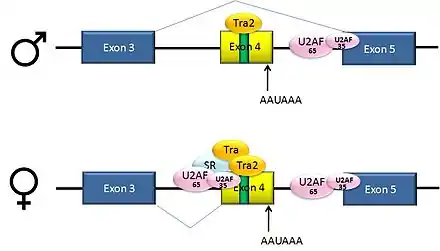| Doublesex | |||||||
|---|---|---|---|---|---|---|---|
| Identifiers | |||||||
| Organism | |||||||
| Symbol | dsx | ||||||
| UniProt | P23023 | ||||||
| |||||||

Doublesex (dsx) is a gene that is involved in the sex determination system of many insects including the fruit fly Drosophila melanogaster.
Sex determination
The gene is expressed in both male and female flies and is subject to alternative splicing, producing the protein isoforms dsxf in females and the longer dsxm in males. The production of dsxf is caused by the presence of the female-specific version of the transformer (tra) gene.[2]
In a sense, the isoform of dsx informs a cell about the organism's sex; for instance, female genitals only develop if dsxf is present. In conjunction with the gene fruitless, dsx also causes differences in the brain structure and behavior of males and females.[3]
Although the details of sex determination differ in the various species, there is a gene related to dsx in vertebrates (DMRT1) and in nematodes (MAB-3). All of these are transcription factors with a zinc finger DNA-binding domain (known as the DM domain) and are involved in sex-specific differentiation.
References
- ↑ Verhulst EC, van de Zande L, Beukeboom LW (August 2010). "Insect sex determination: it all evolves around transformer". Current Opinion in Genetics & Development. 20 (4): 376–83. doi:10.1016/j.gde.2010.05.001. hdl:11370/2174764d-bd1b-4e1f-b142-90aced0c3e55. PMID 20570131. S2CID 205003182.
- ↑ Gilbert SF (2000), "Chromosomal Sex Determination in Drosophila", Developmental Biology (6 ed.), Sinauer Associates
- ↑ Rideout EJ, Dornan AJ, Neville MC, Eadie S, Goodwin SF (April 2010). "Control of sexual differentiation and behavior by the doublesex gene in Drosophila melanogaster". Nature Neuroscience. 13 (4): 458–66. doi:10.1038/nn.2515. PMC 3092424. PMID 20305646. — Lay summary: "'Doublesex' gene key to determining fruit fly gender". ScienceDaily. 2022-02-03. Retrieved 2022-02-05.